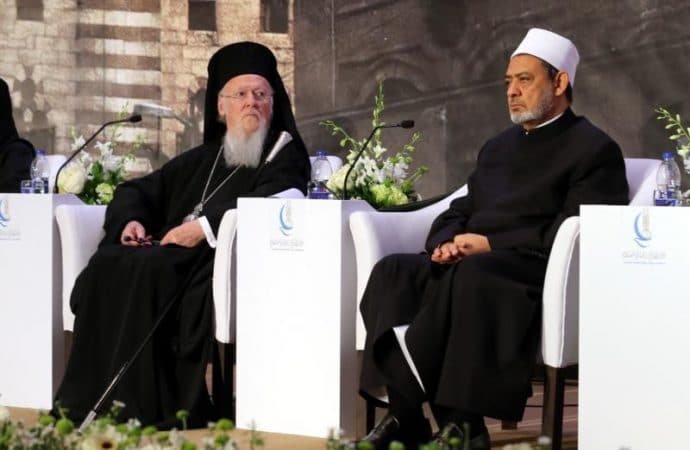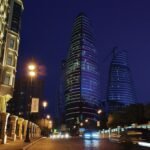The Archbishop and Ecumenical Patriarch of Constantinople, Bartholomew I, from the Eastern Orthodox Church, and Sheik Ahmad el-Tayeb, who is the Grand Imam of al-Azhur University, attended the opening of the al-Azhar International Peace Conference in Cairo, Egypt on April 27, 2017.
The Head of the Roman Catholic church, Pope Francis, attended on April 28th. The focus of the event however was to be the Ecumenical Patriarch of Constantinople Bartholomew who used the opportunity to provide a blueprint for interreligious dialogue in the future with a central role for religion in people’s lives.
It has been speculated before, that the spotlight on the Holy See, Pope Francis may possibly result in reducing the spotlight on Ecumenical Patriarch of Constantinople, Bartholomew I within the global Christian community. With the trip to Cairo, Egypt, by Pope Francis, Patriarch Bartholomew should have been, according to conventional thought, unseen or at the very least in the background.
But religious spheres of influence also appear to be shifting, and old realms of power are no longer as strongly held. With the retirement of Benedict XVI, observers of religious trends have asserted that some of the heavy lifting for Christianity has been done by Ecumenical Patriarch of Constantinople, Bartholomew I. In particular, the intellectual and religious heavy lifting in association with Islam, or rather in relation to Christianity’s relationship with Islam appears to have been taken on by Patriarch Bartholomew I. The reasons for this are not hard to surmise. While the Eastern Orthodox Church has had a longer and deeper interrelationship with Islam in the past than the Roman Catholics, in addition to doctrinal Christology, this is one other major difference between the Roman Catholic Church and the Eastern Orthodox Church.
The religious head of the Eastern Orthodox Church, the Ecumenical Patriarch of Constantinople, Bartholomew I, lives in Istanbul. It is a mostly Muslim city, but one that has the historical distinction of having been a “bridge” for the Muslim and Christian religions for several centuries. In Cairo, Egypt, he spoke to the future of interreligious dialogue and a post-secular world, exhorting the return to a religious way of life, and heralding a time when more people would return to religion.
Patriarch Bartholomew said, “[The] modernistic expectation is of a post-religious secular age…[however, it is] becoming a post-secular period, or even [an epoch] of religious explosion.”
He argued for religion as a core factor to human life, individually and socially. He listed four main reasons for religion affecting humanity. One, he explained that faith and religion connects and taps into some of the greatest concerns of people while providing answers to existential questions and thereby affording meaning and orientation in life. Two, he pointed out that religion was inextricably related to the identity of civilizations and groups.
Three, religion, he argued, has been the creator and preserver of some of the great achievements of culture in addition to the compassion, and ethics, and solidarity seen today.
Four, Patriarch Bartholomew I underlined his conviction that religion remained a vital factor in the peace process. Adverting to an extremely well-known quote by the famed St. Paul, he recalled that God was not the author of confusion but of peace. The Patriarch acknowledged that while religion could, of course divide by causing intolerance and violence – the causation of such chaos was a symptom of its failure, and cannot be said to be its essence which, the Patriarch reiterated, wasthe protection of human dignity.”
He sees relativism and fundamentalism as extremes in the modern era and secularism as a reaction to the extremes that relativism and fundamentalism have been taken to. Patriarch Bartholomew views the religious fundamentalist “outbursts” as ammunition for the critics of religious faith and called on the faithful to resist such influences, but rather remain true to their religious calling.
Memorably, The Ecumenical Patriarch of Constantinople, Bartholomew I closed with these words – “True faith does not release humans from being responsibility for the world, from respecting human dignity, and from struggling for justice and peace. On the contrary, it strengthens the commitment of human action, enlarges our witness for freedom and human core values.”
Al-Azhar, where the speaking engagement took place, is seen as a major institution of Sunni Islam. Patriarch Bartholomew denounced terrorism and disassociated it with any religion, which was received with applause from the crowd.
“This is the biggest challenge for religions, to develop their own potential of love, solidarity, and compassion…this is what humanity deeply expects from religion today,” Patriarch Bartholomew said.
The event at Al-Azhar is certainly interesting for its unifying of three of the most influential religious figures in the world today.Their uniform message of the role of religion in today’s world, its necessity, and their disavowal of religion as the cause of any of the extremist violence follows an old and well worn script. Whether the followers of these religions find new meaning within the words of Patriarch Bartholomew I and will become champions of a tectonic social change remains to be seen.







Article Discussion